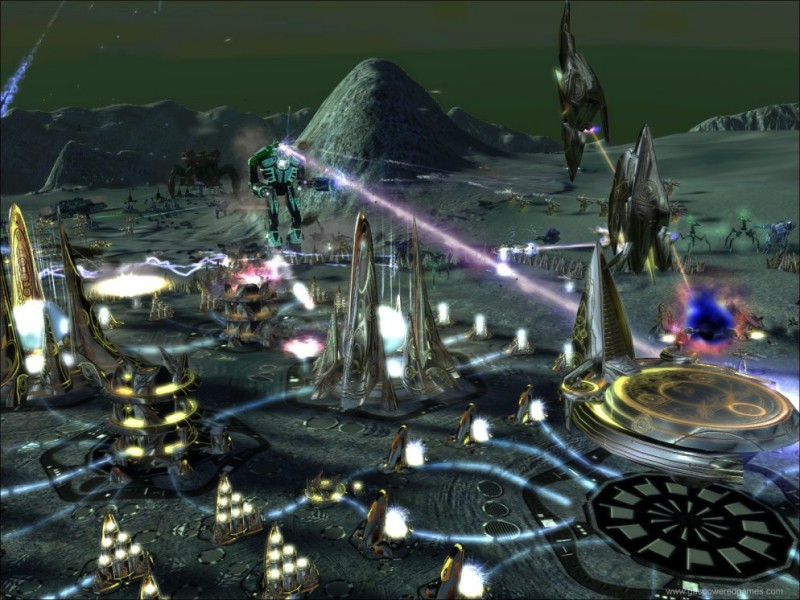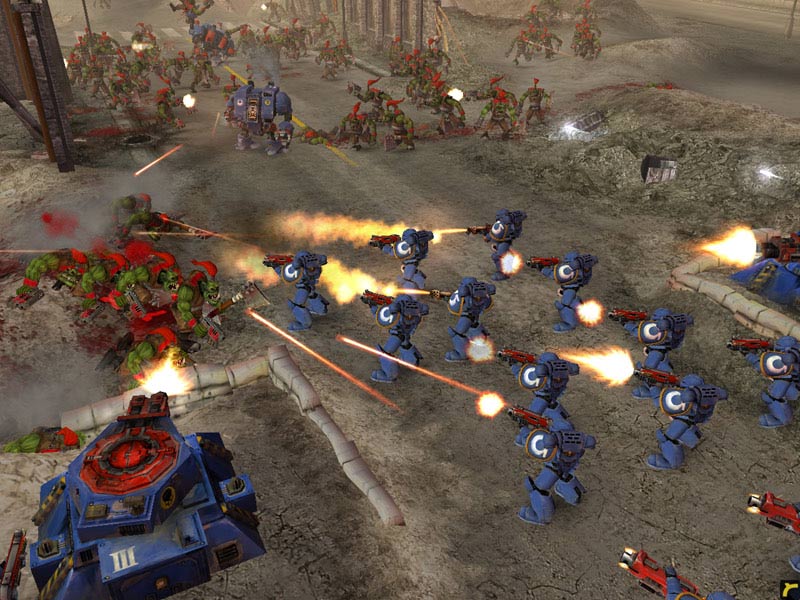In this article, I'm going to seek to elucidate a theory of how players' actions operate in the context of strategy games - mostly, in a competitive setting, though I think it also applies to single player or co-op as well. Specifically, I'm looking at how games' rules direct player action into one of 4 interrelated categories of action, which I'm calling "Preparatory" actions, "Anticipatory" actions, "Direct" actions, and "Reactionary" actions.
'll take a look at each category separately, using examples across a range of games, and then talk about how these relate to one another, and where I feel existing game design could do a better job of providing a more rewarding experience.
Preparatory Actions

Resource harvesting and building production structures are examples of Preparatory actions. You're gearing up for the 'real' fight later on
Most strategy game design leads players to focus intensely on the first category of action. Preparatory Actions are exactly what they sound like. They're the player preparing for something to happen.
Building up your economy (training workers, building Refineries) or manufacturing base (building production structures), researching tech/upgrades, and building out your army are preparatory actions. For these, benefits are often not immediate and may take minutes of careful management to build up to a payoff or better game position.
You're building up towards being able push out your army, or to fend off the enemy's big attack. You're preparing to pull out your deathball, your super-unit or superweapon. You're spending time and mental energy towards the goal of making something happen. These are incremental actions, with a long payoff; few of them reach their peak performance within a small time period.

Supreme Commander has a bevy of intricate Preparatory interactions, such as building adjacency bonuses
These are the actions that players really seem to tend to enjoy on average. Games like Age of Empires, StarCraft 2, and Supreme Commander have intricate and comprehensive systems of Preparatory actions that provide a high degree of control of economic outcomes.
In general, players tend want to build an intricate base that's laid out just so, or maximize their build order to get those Banshees out in as few seconds as possible.
Overly focusing on preparatory actions, however, is bad for a competitive game. Just ask Grey Goo (or Forged Battalion). Grey Goo's gameplay is really loaded towards a gradual ramp up to a large army. Once you're in the middle of a battle, you don't... really... have a lot of tools to react to your opponent's actions, or manipulate the battle in meaningful ways beyond backing off and trying not to lose too much of your army.

Winning a Grey Goo match comes down, more often than not, to your ability to maintain and expand an income to support army replenishment. Income and manufacturing reign supreme, to the game's detriment.
I hate to derail this entirely to dump on Grey Goo, but a lot of this comes down to: slow average unit move speeds, and production and harvesting operations (refineries mostly) being highly defensible, combined with a low-impact counter system, means that harassment is difficult to pull off and it's difficult to counter a large army with a smaller one. The game provides very little wiggle room or ability to pull out any sort of "oh crap!" measure to reverse your fortunes, and a small number of units don't have a lot of room to make a big impact.
Contrast this with StarCraft 2, where a single uncontained Infestor or Oracle can mulch an entire base's worth of income, or in WarCraft 3, where a Blood Mage or Archmage can whittle an army with a lucky hit, or a Demon Hunter or Blademaster can take out an enemy hero leaving their army vulnerable and unsupported - and these are the easy, low hanging fruit interactions to describe.
And, speaking of battle...
Direct Actions

Pew Pew! Direct actions are when you make something happen in a game, whether it's taking territory, moving your army to initiate combat, or doing a rush/surprise attack.
Next, we have Direct actions. I'm skipping Anticipatory for now. I'll do that one last because it's the trickiest to tackle. Direct Actions are, well, doing stuff.
Direct Actions are proactive, aggressive actions you take in the game. Scouting your opponent, trying to cut off their supply line, sniping their workers to slow their economy, or doing a push with your army are primarily examples of actions that fall into this category. Even moving your army to a tactically advantageous position or to cut off your opponent from part of the map would count as 'direct' actions.
For instance, if in Age of Empires you scout your opponent sending an attack force in your direction, you might want to manipulate your forces to be ready for their likely attack point (an anticipatory action). You might also want to change from a more economic focus/boom economy towards maximizing your army, beginning a chain of preparatory actions to deal with your enemy's evident aggression that would overwhelm you if you don't have a large enough army to deal with it.
Sending a counterattack force to hinder their economy while they're attempting to destroy your infrastructure would be an example Direct action.

Direct actions are, by and large, what the Preparatory actions are preparing for. Fast teching to a halftrack in Company of Heroes 2 to catch your opponent off-guard without a counter, getting those Dark Templar out (StarCraft 2) and into your enemy's base before they get detection. These are the direct actions you're taking to swing the course of the game.
Like the name says, these actions are often pretty transitory. In many cases, being the output of a Preparatory action, these are more of a result than a product in themselves. The kinetic result translated from the potential energy generated from preparatory actions.
Direct actions are the second half of what most RTS focus on (the first half being Preparatory actions, of course). Build a bunch of horsemen - preparation, send them to harass enemy villagers - direct action. Turtle up to get a nuclear missle - preparation; slam that missle into the enemy base - direct action.
Reactionary Actions

MOBAs, especially Heroes of the Storm, tend to have comparatively few preparatory actions and focus player attention on Anticipatory and Reactionary action types.
Reactionary actions are the ones players take *during* or *in response* to other actions, particularly in combat situations.
Retreating your army from a losing engagement
using skill shots or abilities to change the course of the combat
offmap/support powers
Most combat-oriented unit 'micro'
Are almost always reactionary in nature.
The line between Direct actions and Reactionary actions blurs a bit at times, and I feel it's mostly one of intent. Remember, we're talking about how players are interacting with the game here. So, where a Direct action is sending your army out to attack your opponent's base (with maybe a surprise sneak attack at enemy production lined up) the Reactionary actions that follow consist of the Psionic Storms, Stalker Blinks, Yamato cannons, Marine micro, grenade tosses, etc that you're performing to ensure the success of your intended course of action.
Reactionary actions are typically loosely related to Preparatory actions: you might need to have constructed a structure or researched an upgrade to enable the Reactionary action (such as with support powers in Command and Conquer 3), or it might be tied to a unit you've had to train (such as Psionic Storm in StarCraft or Anti-Tank grenades in Company of Heroes).
These actions are the ones you take in the moment to impact the outcome of an engagement or interaction. Making the best use of the tools you've acquired in the Preparatory phase to ensure a better outcome for youself than your opponent. Micro. Active abilities. Skill-shots.
Hopefully, I've been able to demonstrate that so far, the majority of interactions RTS, each in its way, inherits from the Preparatory actions of building your economy. We're going to come back to that in a bit. But first, Anticipatory actions.
Anticipatory Actions

Universe at War and the Command and Conquer games feature design that supports some fantastic Anticipatory actions
I saved Anticipatory actions for last since they're not really generally a formalized piece of the puzzle in strategy games. These are actions you perform as a last-minute adjustment right before an engagement begins.
Scanner sweep to find burrowed Banelings/creep tumors prior to attempting to move your army into position to attack the enemy
Splitting your army into 2 groups to surround an incoming enemy force
Engaging an ability that reduces your unit/army's ability to react quickly in exchange for increased defenses (e.g. a Sentry's shield bubble)
Performing a unit configuration action (putting a different troop in a Multigunner IFV in RA3). Sometimes these are Reactionary (like changing a Viking from air to ground mode) but sometimes they don't provide full benefits unless you've done them before combat begins in earnest.
You almost always can't perform the anticipatory action without having prepared (e.g. constructed a unit), but it's not quite the same order of thing, to me. If I were to extablish a relationship between the 4 types of action, it would be:
Preparatory actions precipitate Direct actions. Direct actions precipitate Anticipatory actions. Anticipatory actions preceed Reactions.
Since a lot of this is contextual, a single ability or unit action might be Anticipatory, Reactionary, or Direct depending on context, though I would argue in most cases, the specific design of these abilities almost always makes them most suitable when occurring in a specific category.
Universe at War had some great Anticipatory actions in its faction dynamics.



































